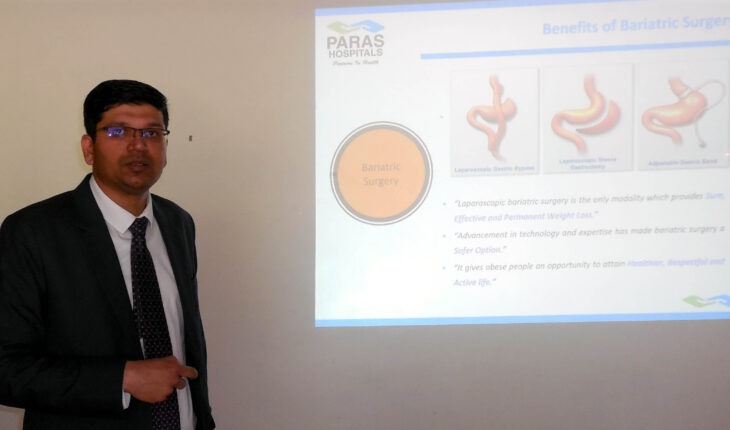SATISH HANDA
Obesity is the fastest emerging life-risking disease and the mother of all other ailments. The 2019 Lancet Commission report has warned that obesity is the first among the three biggest threats to humanity (the other two being under- nutrition and global warming) yet there is no concrete action plan to stop this monster. India faces major health challenge from “obesity in young” and unless this rapidly spreading epidemic is not checked in time, it will continue to predispose to a host of related disorders like Type 2 Diabetes Mellitus, hypertension, heart disease, sleep apnea, infertility and lipid disorders. A recent study also linked morbid obesity to 13 types of cancer.
India is the third most Obese nation with more than 13.5 Cr people suffering from Obesity surpassed only by China and the US. Although, these disorders existed in State earlier too, but in the last one decade, the proportion of population with these conditions has increased drastically, says Dr. Anupam Goel who sees scores of patients with obesity related issues every day, he warns that obesity was spiking state’s burden of “lifestyle diseases”. People with high fasting glucose and high total cholesterol have more than doubled too.
Dr. Anupam while interacting with media persons explained that why obesity should not be taken lightly. He said that, “Obesity is a complex disease that can impact the physical, mental and socio-economic well-being of the individual. In my clinical experience, obesity in women is associated with depression. This can fuel a vicious cycle – if you don’t feel good, you eat comfort food. Unfortunately, the impact is not only devastating for the individual but also for their personal life – increasingly, obese patients are reporting marital problems that even lead to divorce.”
Asked if anything could be done to address this health risk, Dr. Anupam responded that the global surveys, research and studies have all observed that our physical activity is constantly on the decline whereas the mental activity and stress is continuously on the rise. The food intake is on the rise with abundant calories but there is no provision to burn the excess calories in the body. It is possible only by physical activity. Once obesity sets in all the organs of our body need to overwork and finally, they fail giving rise to disease added that Obesity is a complex disease that can impact the physical, mental and socio-economic well-being of the individuals. Obesity in young women has seen steep increase in trend, 1 in 10 adolescent girls and young women in India are suffering from Polycystic ovarian disease, leading to many related issues such as delay in menstrual cycle or no menses and hirsutism features. Weight reduction can help these young women in reversing the health issues to a great extent. If they are slightly overweight, they can go ahead with diet and life style Modifications and exercise but if their BMI goes above 32.5 then we have key hole surgery option for treating their obesity and related issues.
Dr. Anupam stressed that Obesity has been associated with an increase in all-cause mortality rates. According to reports, this disease which has reached epidemic proportions reduces life expectancy by 9 years in women and 12 years in men, studies show that young children are also falling prey to this health disorder, lack of outdoor activities is fueling childhood obesity. These days, children are given mobile phones and laptops which they may find more entertaining than playing outside. Not only does this lead to the risk of obesity, but also to Vitamin D deficiency – which is a risk factor for both obesity and diabetes!”
Despite the consequences of leaving obesity untreated, obese patients do not always consult a medical professional. Dr. Anupam observed that, “In the Indian scenario, more than 60% of individuals wait more than 6-10 years to seek out medically sound weight-loss procedures. Usually such patients are diagnosed with two or more co morbidities, such as diabetes. In my practice, I have observed a rapid rise in the incidence of infertility, depression, NAFLD, kidney failure, cancers, sleep apnea and heart attacks in patients.”Obesity treatment plans aim to limit weight gain, and eventually help patients reach and stay at a healthy weight. Treatment plans usually include diet and lifestyle recommendations, medications and bariatric surgery for eligible patients. Dr. Anupam Goel explained that, “When obesity is treated effectively, many co morbid diseases also show improvement. For instance, bariatric surgery is proven to help control Type 2 Diabetes in obese patients and other co morbidities, which helps reduce mortality.”
Dr. Anupam pointed out that patients can proactively consult a physician to understand whether they are eligible for bariatric surgery – before problems develop, “Most patients seek bariatric consultation when they develop Type 2 diabetes, sleep apnea or when they are refused a knee replacement surgery by an orthopaedician. But with increasing awareness about the role bariatric surgery can play in controlling obesity and diabetes, patients can proactively seek medical advice before their conditions worsen. Once there is a steady and uncontrolled weight gain, it is best to consult a medical expert who can help identify the cause and advise corrective measures.”
Dr. Anupam added that Worldwide, of the four million deaths attributed to excess body weight in 2015, nearly 40% occurred among those whose body mass index (BMI) was above the threshold of obesity, i.e., 30 or above. Stigma associated with Obesity leads to patients not seeking the right treatment and blaming them for the condition, obesity is a Disease which needs treatment by obesity specialist, and government is also taking it seriously and taking strong steps to halt the increasing incidence. He informed that in a major relief for those suffering from obesity-related co morbidities, insurance cover is now provided for obesity treatment as per medical advice. Insurance will cover medically advised treatment as per new IRDAI regulation effective October 2020. He said that, “In my experience, many patients avoid seeking obesity treatment due to financial concerns. Some even question whether they should spend money on a ‘cosmetic’ need. Obesity is a serious medical condition. Covering its treatment with insurance would cement awareness and encourage many patients to seek appropriate medical treatment.”






